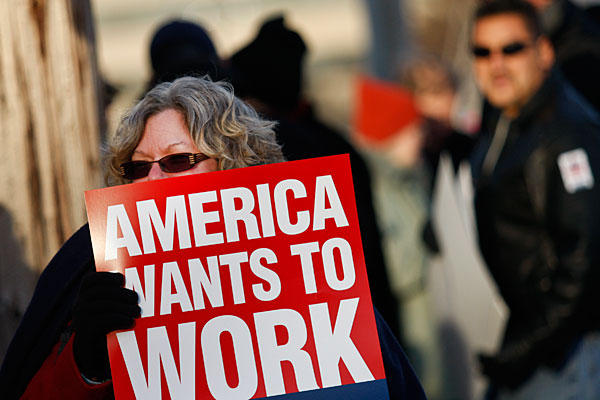If you hear somebody talking about the U.S. “jobs problem,” ask which one.
Let’s talk about three: First, even as unemployment has inched down, the economy has created barely enough jobs to match population growth. Second, this enormous labor-market “slack” has stifled workers’ bargaining power and kept wages low. Third, even with a “tighter” labor market, workers would still be in a weak bargaining position due to policies that have undermined unions, the welfare state, and labor-market regulation.
First, the Great Recession has left the U.S. with an enormous jobs hole. The silver lining of declining unemployment—down from 10 percent to about 7.5 percent over the last few years—surrounds a gigantic dark cloud: The employment-to-population ratio fell dramatically during the recession and has hardly budged since.
That’s because labor-force participation, the percentage of working-age individuals who are employed or looking for work, has plummeted. “It’s the lack of job opportunities,” argues Heidi Schierholz of the Economic Policy Institute, “that is keeping these workers from working or seeking work.” A stimulus too small to make up for the collapse in private spending and a premature turn toward deficit reduction have helped keep us in this hole.
| Whether a job is good or bad is not an inherent fact of the kind of work done. Manufacturing jobs became “good jobs” due to unionization, full-employment policies, labor-market regulations, etc. |
Next, high unemployment makes it hard for workers to bargain higher wages or better working conditions. In May, the International Labor Organization published research showing what looks like a “tradeoff” between employment growth and “job quality” since 2007.
This doesn’t mean, warns economist Dean Baker of the Center for Economic and Policy Research (CEPR), that we “have to kick workers in the face to have a good economy.” Rather, employment in high-quality jobs tends to be stable, while workers in low-quality jobs lack job security. Therefore, low-quality jobs tend to disappear during downturns (making average job quality rise) and reappear during recoveries (making average job quality fall).
On the flip-side, recoveries and booms also mean “tighter” labor markets, which increase workers’ bargaining power and so should increase job quality. This effect typically kicks in, however, only when the unemployment rate gets quite low—below 5 percent—and we’re a long way from there. With economic growth resuming but wages stagnant, corporate profits now account for a near-record percentage of total income. This helps explain why corporations have been content with policies allowing the crisis to drag on through years of lethargic “recovery.”
Finally, lack of high-quality jobs is no mere cyclical issue. It has been a central problem for three decades. Economists tend to emphasize the seemingly inexorable forces of globalization and technological change, insinuating that the lack of good jobs is an unavoidable fact of life.
As Baker notes, there’s not much evidence that technological change is faster now than in earlier eras, nor particularly damaging to ordinary workers (as opposed to technical, professional, or managerial employees). Meanwhile, the current form of economic globalization is not some inevitable course of nature, but a result of the distribution of political power in our society. Elites designed laws and treaties to make capital more mobile across international borders—that is, to make it easier for companies to move (or threaten to move) operations to places where wages are lower and regulations weaker.
Globalization, in turn, is only one of several changes undermining workers’ bargaining power—along with government and employer attacks on labor unions, the weakening of the welfare state, and the rollback of labor regulations. These factors are missing from the mantra that workers should just resign themselves to the new reality, that the “good jobs” are gone and never coming back. But they’re also missing from some well-meaning suggestions for getting those jobs back—whether a more favorable exchange rate, increased education and skills, or industrial policies to create new “blue collar” or “green collar” employment.
Whether a job is good or bad is not, for the most part, an inherent fact of the kind of work done. Manufacturing jobs became “good jobs”—in particular times and places—due to unionization, full-employment policies, labor-market regulations, etc. So-called good jobs in transportation and construction have not “gone” anywhere, but job quality in those sectors has declined due to deunionization, deregulation, and the rise of contingent labor.
Meanwhile, so-called bad jobs in hospitality, maintenance, and other service sectors are not uniformly bad. As Paul Osterman and Beth Shulman note in Good Jobs America (2011), food-service workers in Las Vegas, where unions are relatively strong, make about $2 more per hour than in largely non-union Orlando. Hotel room cleaners in Vegas, meanwhile, make about $4 more per hour than in Orlando.
There is nothing that makes food service an intrinsically bad job, any more than something makes factory work or trucking intrinsically good.
The fault, in other words, lies not in our jobs, but in our politics.
Alejandro Reuss is co-editor of Dollars & Sense.







0 Comments